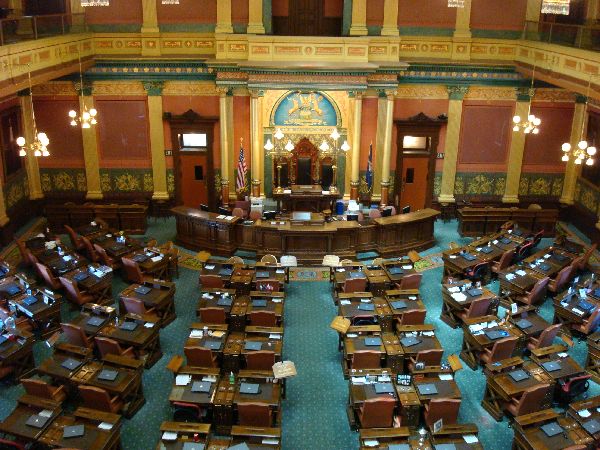Michigan House of Representatives Protests NDAA

Passed in the Senate Tuesday, 98-0, HR 4310 or the National Defense Authorization Act for 2013 is typically a non-controversial military spending outline adopted annually. However, since 2012, and without serious reconsideration of section 1033, civil rights groups are up in arms over the prospect of legalized indefinite detention of US citizens under the act.
Section 1033 reads:
"An authorization to use military force, a declaration of war, or any similar authority shall not authorize the detention without charge or trial of a citizen or lawful permanent resident of the United States apprehended in the United States, unless an Act of Congress expressly authorizes such detention."
This section, amended by Sen. Diane Feinstein (D-CA) and Robert Lee (R-UT), was intended to ensure that due process of law was followed for those detained under suspicion of aiding terrorist cells. However, military force can still be applied within the United States.
Additionally, this creates an avenue for non-native, non-permanent individuals, who are still here legally to not be subject to constitutional due process. These are glaring inconsistencies with the Fifth Amendment of the US Constitution, which applies to all persons in the country, prompting Michigan lawmakers to take action.
The Michigan House of Representatives passed HB 5768 Wednesday, 107-0, in response to the vague provision within NDAA. The bill reads:
“A bill to prohibit any agency of this state, any political subdivision of this state, any employee of any agency of this state or any political subdivision of this state, or any member of the Michigan national guard from assisting an agency of the armed forces of the United States in the investigation, prosecution, or detainment of any citizen of the United States under certain circumstances.”
If Michigan’s response is any indication, there still remain serious concerns with this year’s NDAA and not just with the issue of indefinite detention. Groups like the ACLU, Amnesty International, and others are critical of NDAA’s extension of the operation of Guantanamo Bay through 2013.
A coalition of human rights groups authored a letter to the president to veto the legislation if Guantanamo Bay is allowed to remain open. The letter urged Obama to “make the successful closing of the Guantanamo prison an important part of your historic legacy."
The NDAA for 2013 is now set to enter a conference committee between the Senate and House of Representatives to reconcile differences between it and the Senate version. The White House did issue a veto threat last week to the Senate’s version, S.3254. What the bill will look like when it’s brought to President Obama’s desk is still unknown, but Michigan’s concerns do not seem to be a priority.




